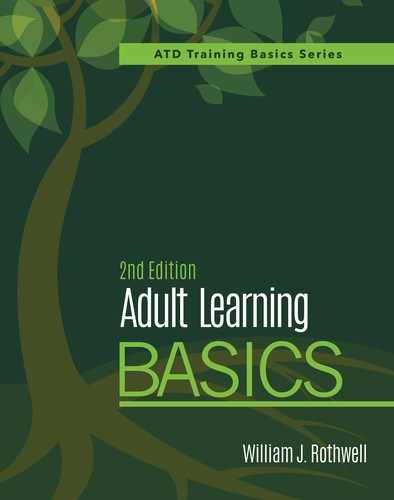Book Description
Everything you need to know to get started as an adult learning professional.
Instructing adults is dramatically different from teaching children, and the effectiveness of training programs is often dictated by how well they apply the principles of adult learning. Enhance your programs with the latest research into how adults learn, remember, and apply knowledge and skills.
Adult Learning Basics examines the principles of adult learning theory and how they relate to the training function by addressing individual learning competencies, organizational learning climate, and technology-related issues. This new edition features the latest research on generational trends, microlearning, and other TD breakthroughs.
Exercises at the end of each chapter help you apply the science and theory to your real talent development challenges. Elevate your practice with this thorough guide, and keep it as an indispensable resource.
Table of Contents
- Cover
- Title Page
- Copyright
- Contents
- About the Training Basics Series
- Preface
- 1. Understanding and Applying Adult Learning Theory
- 2. Theories and Models of Adult Learning
- 3. Using Theory to Design More Effective Learning Experiences
- How Does a Learning Facilitator’s Philosophy Influence Practice?
- How Theories of Learning May Affect Instruction and Training
- A Model of the Learning Process
- Applying a Model of the Workplace Learning Process
- How Facilitation Relates to Learning
- Transformative Learning
- What Is Unique About the Mental, Physical, and Emotional Characteristics of Adults?
- The Role the Senses Play in Learning
- Getting It Done
- 4. Designing Learning Experiences
- 5. Leveraging Adult Learner Differences
- 6. Managing Cultural Differences in Learners
- 7. Making Learning Environment a Key to Success
- What Is Learning Climate?
- How Does Learning Climate Affect Individual Learning?
- What Are Learning Competencies?
- How Do Learning Competencies Relate to Job Competencies?
- How Do Learning Competencies Affect Individual Learning?
- How Is the Talent Developer’s Role Influenced by Learning Climate and Learning Competencies?
- Relating Learning Climate, Learning Organization, Organizational Learning, and Small-Group Learning to Adult Learning Practice
- How Learning Climate Influences Adult Learning
- How Is Learning Climate Improved?
- Getting It Done
- 8. Putting Technology to Work for Learners
- 9. Using Proven Facilitation Techniques to Drive Learning
- What Is a Facilitator, and How Is a Facilitator Different From an Instructor?
- The Role of Facilitators in Clarifying Roles and Ground Rules
- Learners’ Roles in Facilitated Learning and Meeting Special Challenges
- Facilitator Competencies and Behaviors
- Differences Among On-Site, Online, and Blended Format Facilitator Behaviors
- Improving Facilitation Skills
- Getting It Done
- 10. Reading the Future of Adult Learning: Seven Hopeful Predictions
- Prediction 1: More Focus on Informal and Incidental Learning
- Prediction 2: More Appreciation for Feelings, Values, Ethics, and Cultural Awareness
- Prediction 3: Increasing Interest in the Special Needs of Older Adult Learners
- Prediction 4: Increasing Sensitivity to Diversity Among Talent Developers and Adult Educators
- Prediction 5: Technology’s Impact on Learning Will Continue Unabated
- Prediction 6: More Attention Will Focus on Building Learning Agility and Learner Competencies in Learning How to Learn
- Prediction 7: More Attention Will Focus on the Context in Which Learning Occurs
- What Should Learning Professionals Do?
- Getting It Done
- References
- Additional Resources
- About the Author
- Back Cover
